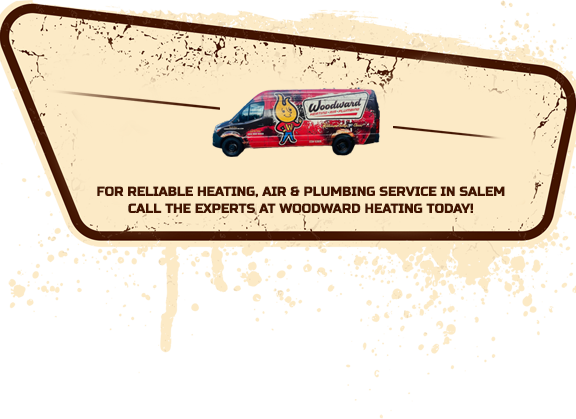With all the talk of the COVID-19 pandemic, many homeowners in Salem, OR, wonder if their heating, ventilation and air conditioning systems will offer protection against viruses. Some people fear that a poor HVAC system will make viruses spread more through a household. Because Salem has cool winters, rainy springs and autumns and warm summers, you’ll be using your heating and cooling system almost every day of the year. The information about COVID-19 is changing as scientists learn more about the virus that causes this disease, and there’s a lot of misinformation online. Read on to learn some myths and truths about how your heating and cooling system helps keep you healthy and what it can’t or won’t do when it comes to airborne viruses.
How Airborne Viruses Spread
When a person coughs or sneezes, they spray tiny droplets into the air. Those droplets may contain infectious viruses. When another person walks through the same area, they could be exposed to droplets that are still suspended in the air. With each breath, they could take in some of the virus particles. If enough virus particles are taken into the lungs, a person could catch the illness caused by the virus.
Myth: Airborne Viruses Stay in the Same Place
Your Salem home’s air moves through each room. If you turn on an exhaust fan or ceiling fan, this creates an air current. A cycle of your home’s heating or cooling system also creates an air current. When the air is moving, the virus-laden droplets move, too. The air currents disperse the viruses over a wider area of your home’s living spaces.
Myth: All Viruses Settle Out of the Air
Some of the droplets from a cough or sneeze are big. They settle out of the air quickly. They land on a surface, where a virus can remain infectious for a few hours to a few days. How long it remains infectious depends on the type of virus, type of surface, indoor temperature and indoor humidity level. The tiny droplets take more time to settle out of the air. If you happen to cough or sneeze near an air supply or return vent during a heating or cooling cycle, the smallest and lightest droplets will be dispersed quickly, before they have a chance to settle.
Myth: Adding Ventilation Makes You More Likely to Get Sick
Breathing in the same air all day long increases your chances of getting sick. If your home has a tight envelope, that’s good for your utility bills. However, it’s not as good for your indoor air quality. You’ll need to turn to mechanical sources of ventilation in order to bring fresh air into your home. By displacing the stale air with the virus particles in it, ventilation lowers your chances of getting sick. Some methods of ventilation to consider include:
- Whole-house fan
- Attic fan
- Energy recovery ventilator
- Heat recovery ventilator
- Exhaust fans
Opening the windows is another way to add fresh air to your home, but doing this also allows pollen to get inside your house. Avoid opening the windows if your heater or air conditioner is cycling. The open windows will let the heated or cooled air leak out of the house, which increases your utility costs. If you do open the windows, aim for cross-ventilation. This involves opening the windows on opposite sides of the same level of your house. Doors with a screen can also be open, and they’ll let fresh outdoor air flow into your home the same way that an open window does.
You may also consider adding ventilation with one or more fans. If you use one fan, set it up to blow the air in the natural direction of airflow in your home. If you have two fans, set up one to bring air in and the other to push air out of your home. Direct the fans to blow air away from people.
Myth: Dry Air Dries Out Viruses
The ideal indoor humidity level is 30% to 50%. If the humidity in your home is lower than 30%, you’ll notice some issues that could increase your risk of getting sick from airborne viruses. Your nasal passages need to be moist to capture particles, bacteria and viruses before they make their way into your lungs. If your nasal passages get too dry, the mucus can’t do its job of capturing germs. Dry nasal passages are more likely to crack. Viruses can easily enter your body through a tiny break in your skin. Dry indoor air causes the same problems with your throat. If your eyes get too dry, you’re more likely to rub them. They’ll feel irritated and sore. Rubbing your eyes provides a direct path for viruses and other germs to get into your body.
Fact: Air Filters Catch Germs
Your heating and air conditioning system has a filter. This filter captures dust and debris so that it doesn’t clog the equipment or build up on the coils. The filter also cleans your home’s air. Heating and cooling filters are rated with the minimum efficiency reported value (MERV) system. To lower your risk of getting infected with airborne viruses, invest in the highest MERV rated filter that works with your heating and cooling system. MERV ratings range from 1 to 20. A MERV rating of 16 or higher captures 99.7% of bacteria and viruses. This is a hospital-grade filter that is specifically designed to eliminate airborne pathogens from indoor air. For the best results, check the filter every month and replace it as soon as it’s visibly dirty or every two to three months, whichever happens first.
Fact: Air Purifiers Reduce Airborne Viruses
Another way to reduce viruses, bacteria and allergens in your home is to get an air purifier. Portable air purifiers are designed to cleanse the air in one room. They have capacities of up to 400 square feet. They’re ideal for a bedroom. They may use ozone or electrostatic technology. If you use one, be sure to direct the stream of air away from the room’s occupants. Another option to clean the air in your Salem home is a whole-home air purification system. These use UV-C technology. They work with your heating and cooling system. Every time a heating or cooling cycle begins, the whole-home air purifier inactivates bacteria, viruses and allergens.
What Health Experts Have to Say
The Centers for Disease Control and Prevention recommends a multi-pronged approach to lowering your risk of getting sick from airborne viruses. In addition to covering your coughs and sneezes and staying away from others, the CDC suggests using your heating and air conditioning system as part of a plan to protect yourself and your family from airborne viruses.
At Woodward Heating Air Plumbing, we’re proud to provide Salem and Aumsville-area home and business owners with reliable heating and cooling installations, repairs, and replacements. You can also count on us for fireplace, gas piping, indoor air quality, and ductless services. We’ve been serving the community since 1989, and we aim to provide fast and effective HVAC services. To learn more or to schedule an appointment, contact us today.





